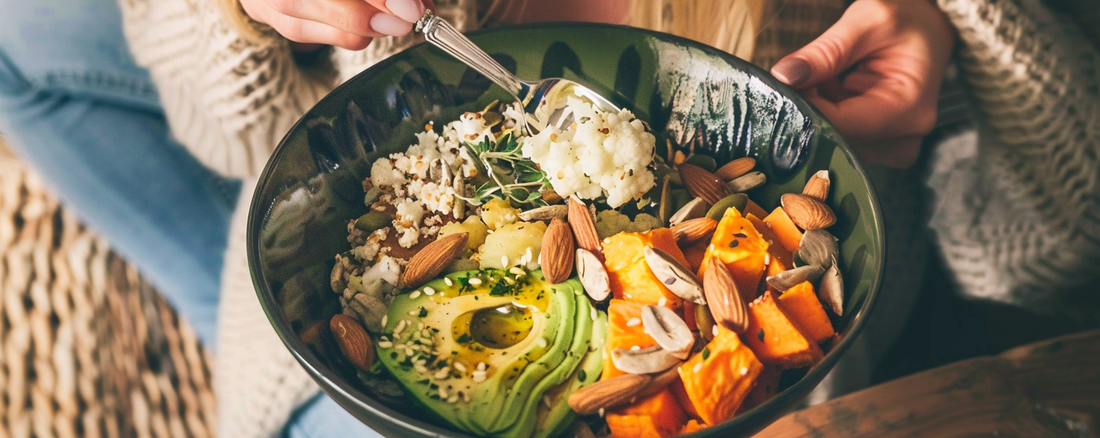Introduction
Hey everyone! So, we're diving into the world of health and nutrition, right? And guess what's super important in that world? Vitamins!
Yeah, those tiny things you hear about all the time but might not pay much attention to. Well, there's this one hero in the vitamin squad called biotin, or you might know it as vitamin B7. It's like the secret sauce that helps our bodies turn food into energy. Pretty cool, huh?
Now, for those who are all about that vegan lifestyle, getting enough plant-based biotin can seem a bit like a mission.
But don't worry, it's totally possible with the right veggies and maybe some vegan biotin supplements thrown into the mix. This article? It's going to be your guide into the vegan biotin universe.
We're talking about how your body gets biotin from your food, what it does with it once it's inside, and how to make sure you're getting enough to keep you running like a well-oiled machine. And we're sticking to the real deal science stuff, no wandering off topic. Let's get this adventure started!
How Vegan Biotin Works
Alright, let's break this down like we're in the middle of a science class that's actually cool.
So, you know how we all need certain stuff to keep our bodies running like well-oiled machines?
Well it turns out, Biotin, or vitamin B7, is one of those must-haves! It's like the secret sauce that helps our bodies turn food into energy.
Now, for the vegans out there, getting biotin into the system is a bit of a special mission since they're not getting it from animal products.
Here's where it gets science-y: the main action happens in the small intestine. This is where biotin jumps from the food you eat into your bloodstream, thanks to some helper proteins called biotin transporters.
Think of these transporters like the cool bus drivers who make sure biotin gets to its destination across your body, helping you metabolize fats, carbs, and proteins.
But here's the catch – not all biotin boarding passes are created equal. Some things in your diet can make it harder for biotin to get absorbed, like certain raw egg whites (but that's more of a non-vegan problem) or just not eating the right biotin-rich foods.
Plus, how healthy your gut is can either make it a smooth ride or a bit of a bumpy road for biotin absorption.
So, why should we care about all this? Well, for anyone, especially vegans, understanding how to get enough biotin is like knowing the cheat codes to keep your body's energy levels up and running smoothly.
Biotin’s Function in the Body
Okay, imagine if your body was like a super busy city, and biotin was one of the main workers keeping everything running smoothly.
This worker, biotin, has a super important job as a coenzyme. Think of it like a key helper for a bunch of enzymes called carboxylases, which are like the city's builders and maintenance crew.
They're super busy doing all sorts of stuff that keeps us healthy and full of energy.
First off, biotin helps make fatty acids, which are like the bricks and mortar of our cell walls. Without these, our cells would be like houses without walls – a total disaster!
These fatty acids also send signals around the body, telling it how to manage its energy.
Then, there's the protein thing. Proteins are like the building blocks of everything in our body, and amino acids are the pieces of those blocks.
Biotin steps in to help turn some of these amino acids into energy, which is super handy when you're running low on fuel, like when you're fasting or pulling off an all-nighter for a marathon gaming session.
And there's this thing called gluconeogenesis – a fancy word for making glucose (that's sugar) from stuff that's not carbs.
It's like making lemonade without lemons. This is super important when you're running on empty and need energy but don't have any immediate sugar sources around.
Biotin is key here, helping to make sure your brain and muscles get the sugar they need to keep going.
So, why does all this science talk matter, especially for vegans? Well, since vegans don't eat animal products where biotin can be found, they need to make sure they're getting enough of it from other foods or vegan biotin supplements, like the one we sell.
It's like making sure our city worker, biotin, has all the tools and materials it needs to keep the city – our body – running like a well-oiled machine.
Without enough biotin, things might start to break down, and we definitely don't want that.
So, eating right or taking supplements is like making sure biotin shows up for work every day with a hard hat and a lunchbox, ready to keep our body-city in tip-top shape.
How do we get biotin from our diet?
Diving into the world of vegan diets, it's like unlocking a treasure chest filled with gems of nutrition, and one of those shiny gems is biotin.
Picture this: a plate loaded with almonds, sunflower seeds, whole grains, avocados, sweet potatoes, and a mix of veggies like cauliflower and mushrooms.
Not only does this look like a feast for the eyes, but it's also a powerhouse of biotin and a bunch of other nutrients that keep you ticking over nicely.
But here's where it gets a bit tricky – not all the biotin in these foods is ready and waiting to jump into your system.
This is where the term "bioavailability" comes into play. Imagine bioavailability as a VIP pass that lets biotin get from your food into your body. Some sneaky substances in food can hog biotin, making it hard for your body to absorb it. For vegans, the usual culprit, avidin (found in raw egg whites), isn't a worry. But, other things like dietary fiber and phytates in whole grains and legumes can still gatecrash the biotin absorption party.
Cooking can be a game-changer here. Just like a magic spell, the right cooking method can break down those gatecrashers, making biotin more available to your body. It's like turning a locked door into an open gateway, letting biotin glide smoothly into your system.
So, for my vegan pals out there, getting your biotin fix is about more than just munching on biotin-rich foods. It's also about how you prepare them. Being a bit strategic with your food choices and how you cook them can make all the difference in keeping your biotin levels topped up. This way, you're not just eating to fill up; you're eating to fuel up, ensuring your body gets all the good stuff it needs to thrive.
Do Vegan Biotin Supplements Work?
Let's talk about a little backup plan called biotin supplements. Sometimes, even with the best intentions, our plates might not always be packed with enough biotin-rich goodies. Or maybe, life's just throwing us curveballs like growth spurts, health hiccups, or just super busy days that leave us grabbing whatever's quickest. That's where a little extra help from vegan biotin supplements can be a game-changer.
Think of these supplements as your nutritional safety net, catching you on those days when your diet might not be up to par. They're like having a little insurance policy against biotin deficiency, which, let's be honest, none of us want to deal with. No one's got time for feeling off their game with symptoms like tiredness, sad moods, or not feeling like your hair and skin are shining bright.
Plus, let's talk convenience. For those of us always on the move or living somewhere where the biotin buffet isn't always open, supplements can be a real lifesaver. Pop a supplement, and you're on your way, no stress. And if you're worried about going overboard, biotin's got your back—it's water-soluble, so if you take a bit more than you need, your body just waves goodbye to the excess.
Utilization and Recycling
The human body is like a high-tech recycling plant when it comes to handling biotin, showcasing just how crucial this nutrient is for keeping us ticking. Biotin isn't just a one-hit-wonder; after it's done its job helping enzymes break down fats, carbs, and proteins, the body doesn't just toss it aside. Nope, it's got a whole system in place to make sure that biotin gets back in the game.
The Body's Biotin Boomerang
After biotin has played its part as a coenzyme, it's not out for the count. The body employs a special set of enzymes, called biotinidases, to snatch biotin back from the brink. These enzymes expertly detach biotin from its enzyme buddies, setting it free to jump back into action. This recycling act is super important for keeping our biotin levels on point, especially when our diet might not be delivering all the biotin goods we need.
Biotinidase doesn't just work in one spot; it's got a backstage pass to the whole body, making sure biotin is ready to rock and roll wherever it's needed. This ensures that every cell gets a piece of the biotin action, keeping our metabolism running smoothly without constantly needing new supplies from our meals.
Biotin Utilization and Recycling
Here's how the biotin comeback tour works:
- Detachment: Biotinidase jumps into the mosh pit and breaks biotin free from the enzymes it's been hanging out with.
- Recovery: Once biotin is flying solo, it's ready to be scooped up by cells for another round.
- Reutilization: Cells then give biotin a new pass, hooking it up with fresh enzymes so it can keep the metabolic party going.
This whole process is like the body's way of making sure biotin tickets never go to waste, ensuring we've always got enough to keep our energy levels up and our systems running smoothly.
Why This Rocks
The fact that our bodies go to such lengths to reuse biotin shows just how vital this nutrient is. It's pretty rare to run into serious biotin trouble, thanks to this efficient system. But, if someone's biotin recycling crew (aka biotinidase) isn't up to snuff due to genetic quirks, they might need an extra biotin boost from their diet or supplements to keep the show on the road.
In essence, the body's biotin recycling gig is a prime example of how awesome and efficient our internal processes are, making sure we're always ready to rock, no matter what our diet looks like.

